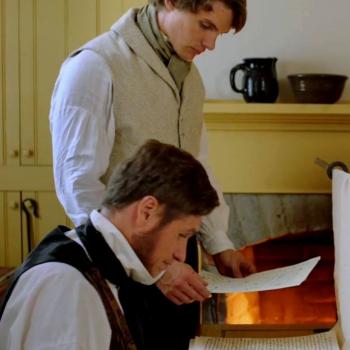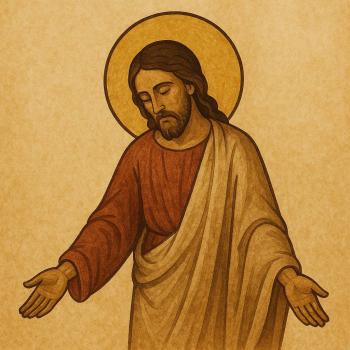Now Featured in the Patheos Book Club
Playing God
Redeeming the Gift of Power
By Andy Crouch
Book Excerpt: Making Something of the World
What, then, is power? May I begin with a deceptively simple definition: power is the ability to make something of the world. Here I am borrowing unabashedly, just as I did in an earlier book, from the journalist Ken Myers, whose simple and profound definition of culture will serve us so well: culture is what human beings make of the world, in both senses-the stuff we make from the raw material of nature, but also the meaning we make. This is our basic task, preoccupation and quest: to make something of a world that comes with no ready explanation yet has seemed to nearly every human being to throb with meaning.
Power is simply (and not so simply) the ability to participate in that stuff-making, sense-making process that is the most distinctive thing that human beings do.
Of course, when we define power this way we recognize that we human beings are not the only creatures that make something of the world. Chimpanzees do it, and (with less complexity and more methane out the back end) so do cows. At an elemental level all life exhibits power, transforming its surroundings. And all life requires power. The yeast that transforms my dough into bread requires the input of heat and the stored energy in the carbohydrates of the flour in the dough. The tree in our back yard, shading our home with the new green of spring leaves or covering our lawn with the yellow blanket of fall, draws its power from the sun itself, the ultimate source of almost all the power we or any other part of creation have yet learned to harvest. The same sun, indeed, once shone on eons of living creatures that then slowly decomposed in layers far beneath the ground, becoming the coal, gas and oil that make our lives so seemingly effortless in so many ways. In all these transactions, slow or speedy, local or global, power pulses wherever we find life. When power departs, as in some of the darkest corners of the oceans or in the final gasp of death, world making also ends and, dust, we return to the earth that for a little while we had the power to change.
So power, in this broadest sense of making something of the world, is a universal quality of life, from coral reefs to cellists. But only human beings, as far as we can tell, exercise power in the second sense that Myers calls our attention to, not just making stuff but making sense. It is the unique power of human beings to invest our creations with meaning, to interpret the world rather than just blunder through it. As singular as our human power has become to physically reshape the world into gardens and cities, dammed rivers and mushroom clouds, even more singular is our ability to pass on meaning to the next generation, to shape their horizons of possibility with interpretations of not just what the world is but what it is for.
And what is powerlessness? It is being cut off from these two kinds of world making. The powerlessness of death means that the world may act on us, but we will never again act on it. Such powerlessness, just as much as power, is a fundamental feature of human existence, a reality of which those in the prime of our lives probably need all the reminding we can bear. We began, not so long ago, quite unable to make anything of the world, and we will soon be, much sooner than we can truly grasp, once again at the mercy of others' power to sustain us. And a moment after that, as far as this world is concerned, we will be gone altogether. Our short interlude of power takes place between two infinitely long seasons of helplessness. The phrase "temporarily abled," sometimes used by advocates for the "disabled" to describe those of us who currently have command of our bodies' functions, is empirically, unassailably true.
Just as there is more to world making than just making stuff, however, there is more to powerlessness than being unable to bring about a tangible change in the world. The deeper and more debilitating form of powerlessness is to be cut off from making meaning. There are able-bodied people all over the world whose physical capacity to make something is undiminished (much less diminished, in fact, than my own body's after decades working at a screen), but who are denied any opportunity to make their own sense of the world. Perhaps they were denied this by being cut off from education, the process by which human beings gain the cultural fluency to participate in culture's ultimate task of meaning making. Perhaps they are denied by deeply ingrained assumptions about who matters in the world—excluded from the circle of meaning making by virtue of their skin color, gender or dialect. Their attempts at sorting out meaning, bestowing significance and telling truthful stories are ignored, mocked or worse. In an unsettling irony, millions of them make the very cultural artifacts that allow us to engage in meaning-making acts—within reach as I write are my smartphone, my laptop, my ebook reader, my widescreen monitor, all the essential tools that allow me to make something of the world in the deepest sense. But the voices and stories of those who made these tools remain unheard and untold, and the goods they manufacture arrive in our stores and homes sealed in supernaturally clean plastic, from which human fingerprints have been conscientiously removed.




